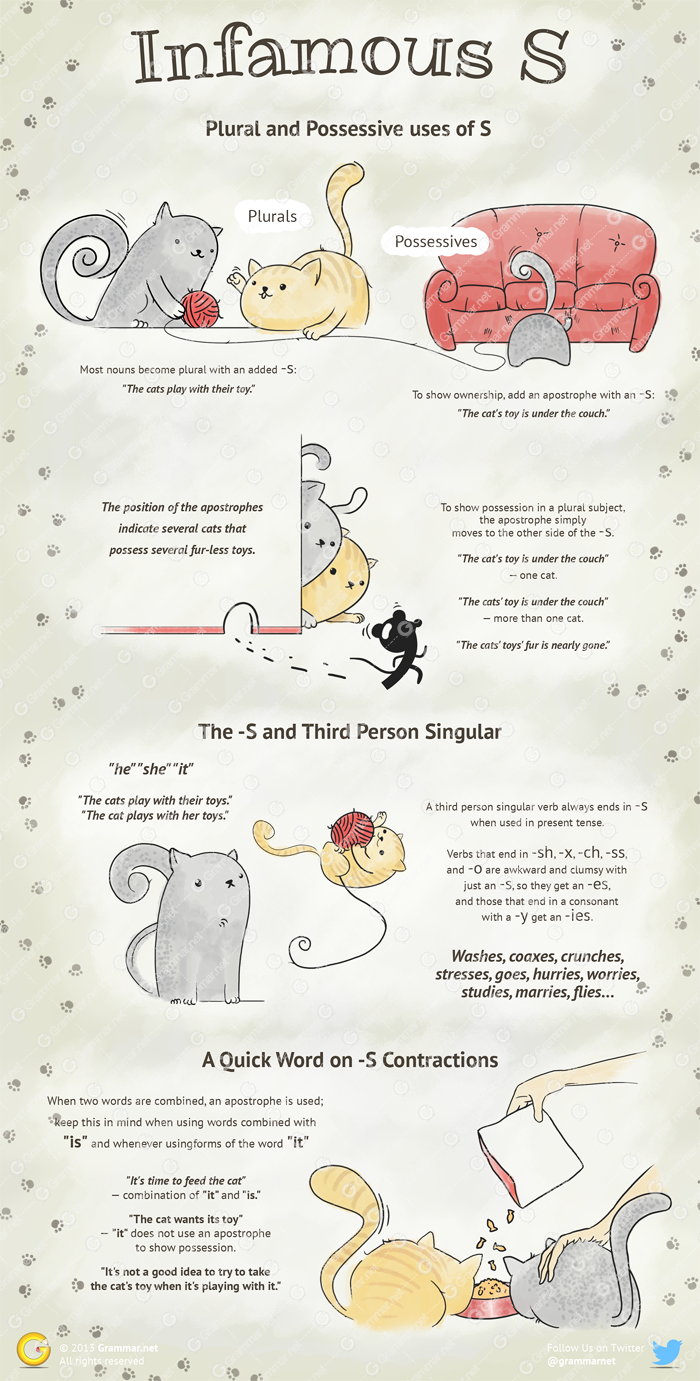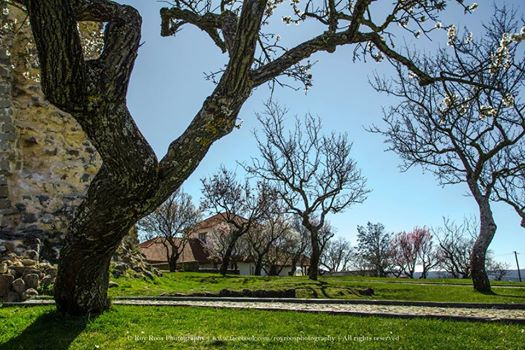(Click on the recipe)
30.9.14
29.9.14
Uses of -s [infographic]

Plural and Possessive Uses of -S
Plurals
Most nouns become plural with an added -s: “The cats play with their toy.”
Most nouns become plural with an added -s: “The cats play with their toy.”
Possessives
To show ownership, add an apostrophe with an -s: “The cat’s toy is under the couch.”
To show ownership, add an apostrophe with an -s: “The cat’s toy is under the couch.”
So far, everything is simple, but what happens when several cats lose a toy under the couch? To show possession in a plural subject, the apostrophe simply moves to the other side of the -s.
“The cat’s toy is under the couch”–one cat.
“The cats’ toy is under the couch”–more than one cat.
“The cats’ toy is under the couch”–more than one cat.
The apostrophe adds clarity, letting us know whether the noun is plural or singular, depending on where it is. In the first example, chop off that apostrophe and everything after it, and the root is “cat,” while the root in the second example is plural: “cats.”
For a “worst case scenario,” we can say that these cats have several toy mice, and they have played with their mice for so long that the toys have hardly any fur on them.
“The cats’ toys’ fur is nearly gone.”
The position of the apostrophes indicate several cats that possess several fur-less toys.
The -S and Third Person Singular
Third person singular is anything that excludes the speaker and the person spoken to and can be considered a “he,” “she,” or “it.” So far, we have seen multiple cats play with toys, but when the subject of the sentence is a single cat, the -s relocates from the noun to the verb.
“The cats play with their toys.”
“The cat plays with her toys.”
“The cat plays with her toys.”
A third person singular verb always ends in -s when used in present tense, but sometimes that -s needs a friend or two. Verbs that end in -sh, -x, -ch, -ss, and -o are awkward and clumsy with just an -s, so they get an -es, and those that end in a consonant with a -y get an -ies. Don’t panic, here are a few examples:
Washes, coaxes, crunches, stresses, goes
Hurries, worries, studies, marries, flies
Hurries, worries, studies, marries, flies
A Quick Word on -S Contractions
The -s and its apostrophe are very abused, and some of the confusion may stem from contractions. When two words are combined, an apostrophe is used; keep this in mind when using words combined with “is” and whenever using forms of the word “it.”
“It’s time to feed the cat”–combination of “it” and “is.”
“The cat wants its toy”–”it” does not use an apostrophe to show possession.
“It’s not a good idea to try to take the cat’s toy when it’s playing with it.”
“The word ‘it’ is particularly selfish with its unique requirements.”
- See more at: http://www.grammar.net/infamous-s#sthash.oLMF1ruF.dpuf
“The cat wants its toy”–”it” does not use an apostrophe to show possession.
“It’s not a good idea to try to take the cat’s toy when it’s playing with it.”
“The word ‘it’ is particularly selfish with its unique requirements.”
28.9.14
27.9.14
26.9.14
Birdy - Not About Angels | Video & Lyrics
We know full well
there's just time
So is it wrong to
toss this line?
If your heart was
full of love
Could you give it
up?
'Cause what about,
what about angels
They will come,
they will go, make us special
Don't give me up
Don't give me up
How unfair it's
just our love
Found something
real that's out of touch
But if you'd
search the whole wide world
Would you dare to
let it go?
'Cause what about, what about angels
They will come, they will go, make us special
Don't give me up
Don't give me up
'Cause what about, what about angels
They will come, they will go, make us special
It's not about, not about angels
Angels
25.9.14
24.9.14
23.9.14
22.9.14
Verbs often confused in English [infographic]

Make or Do
Make: used when a physical object, an action/reaction or a sound/speech is created. It can also refer to food.
“My dad likes to make furniture.”
“Frogs make me laugh.”
“Chickens make clucking noises.”
“Suzie will make dinner.”
“Frogs make me laugh.”
“Chickens make clucking noises.”
“Suzie will make dinner.”
Do: used for jobs or activities and can be paired with words like “anything” or “something.” It is also used as generic action, such as “do the dishes” or “do my hair.”
“I need to do housework.”
“Before she can do anything, Betty needs to do her hair.”
“Before she can do anything, Betty needs to do her hair.”
Refuse vs Deny
Refuse: to decline to accept/give; unwillingness.
“The patient refused treatment.”
“I refuse to argue.”
“I refuse to argue.”
Deny: declaring untruth, disagreement, to withhold or disown something, to reject or contradict.
“Most deny that the sky is orange.”
“He denied taking my cheeseburger.”
“The kids were denied a snack when they broke the lamp.”
“He denied taking my cheeseburger.”
“The kids were denied a snack when they broke the lamp.”
Say vs Tell
Say: a verb usually used without an object. With an object, add “to.”
“Say anything.”
“She knew what to say to her sister.”
“She knew what to say to her sister.”
Tell: informs or instructs; usually, the person instructed immediately follows.
“Tell your brother to make his bed.”
“Please tell me where my shoes are.”
“Please tell me where my shoes are.”
Stay or Remain
In most cases, these words are interchangeable.
“Audrey will stay/remain behind.”
“We decided to stay/remain in Peoria another week.”
“We decided to stay/remain in Peoria another week.”
Both words have also developed unique idiomatic uses.
“When she visits, she will stay with her aunt.” (temporary residence)
“Don’t stay out late.” (away from home)
“Though the team lost, fans remain loyal.” (continue in spite of)
“The crooks remain in custody.” (idiom requires both “remain” and “custody”)
“Don’t stay out late.” (away from home)
“Though the team lost, fans remain loyal.” (continue in spite of)
“The crooks remain in custody.” (idiom requires both “remain” and “custody”)
Sit vs Seat vs Seated
Sit: a verb.
“Find somewhere to sit.”
“Most prefer to sit when they eat.”
“Most prefer to sit when they eat.”
Seated: a verb.
Incorrect: “Please wait to be sat.” “The waitress sat them.”
Correct: “Please wait to be seated.” “The waitress seated them.”
Correct: “Please wait to be seated.” “The waitress seated them.”
Seat: a verb and a noun.
“Please seat yourselves.”
“Please find a seat.”
“Please find a seat.”
Shall or Will
Traditionally, “shall” is coupled in future tense with first person “I” and “we.” “Will” is used for second and third person: you, he, she, they and it. To emphasize conviction, “shall” is used in second and third person, and “will” is used in first person.
“We shall take a walk.”
“He will go home when the movie is over.”
Both are simply action sentences.
“He will go home when the movie is over.”
Both are simply action sentences.
“He shall do the dishes before he plays video games.” This shows conviction and says that Mom really wants those dishes done.
“I just bought a new dress; I will go to that dance if I have to crawl there.” The speaker is determined to get to that dance.
- See more at: http://www.grammar.net/confusingverbs#sthash.sfIziPZx.dpuf
“I just bought a new dress; I will go to that dance if I have to crawl there.” The speaker is determined to get to that dance.
21.9.14
In a recent interview, John Malkovitch gave his opinion about Portugal, the city of Lisbon and how fine is to live in Portugal, either working or retiring.
John Gavin Malkovich born in the United States in 1953, is an actor, producer, director, and fashion designer.
In his long carreer he appeared in more then 70 pictures.
For his roles in Places in the Heart and In the Line of Fire, he received the Academy Award nominations.
1. John knows Lisbon for more then 15 years. He has been working and visiting Lisbon for several times.
2. His first impression, as far as he could remember, was the people – friendly, smiling and terrific in his own words. He loves Lisbon, in fact.
3. Malkovitch appreciates location and geography, architecture and its variety. Great people everywere and good food.
4. He also love fado, the old traditional music. Fado has is root on words like “destiny” and “fate” and it can be traced to 19 th century or even earlier.
5. Questioned if Lisbon is still the same, in his thought he believes that should not be the same, as Lisbon and Portugal received now much more people visiting these places, but still maintains its unique characteristics and thus he still prefer to come here in holidays.
6. It is also a good place to live. Not very far from the place he lives nowadays. He was considering to buy a house close to Lisbon, but was already sold when it comes closed to the decision.
7. Malkovitch in what concerns recommendations to visit in Lisbon, he mention things like, just walking around, enjoying the beauties of nature or historical and cultural activities., museums, restaurants… There are lots of things to do in Lisbon
20.9.14
10 Reasons for Living in Portugal
A sumary of relevant facts to be considered.
You’ve probably spent some time in Portugal, either on business or for leisure reasons. Portugal is one of the best places to live.
Why you should not move and start a new life in Portugal? You can establish your business and work or have your retirement in Portugal, in a fantastic place. It is a matter of choosing the right options to meet your expectations and desires.
Portugal has good things to offer. We describe just 10 reasons to help your decision to live in Portugal.
Algarve
Climate
Portugal has around 3000 hours of sunshine a year, an average of 5 hours in winter and 12 hour in summer.
It is one of the warmest Countries in Europe. In mainland, the average temperature goes from 12 degrees Celsius in the North and Interior Regions to 18 degrees in the South.
The People
The Portuguese are always smiling. They are friendly and like to help everyone. Do not be afraid to ask something to a Portuguese, they will be very pleased to help you.
In general, they speak English and sometimes French too. But mostly they always make an effort to communicate with foreigners.
Geographical
Portugal is on the hinge of three continents – Europe, Africa and America.
There are 3 international airports in Lisbon, Faro and Porto. Major cities also have national air links to these.
Madeira and Azores, in the middle of Atlantic can also be achieved by air.
All Country has a good network of roads. We can travel by car between Lisbon and Braganca in the northeast of Portugal, in about 6 hours. The same time to go by car, from Lisbon to Madrid.
Miranda do Douro
The Country
Portugal has its geographical borders already defined from almost nine centuries. Portuguese are very well linked together.
Portugal is a member of the European Union since 1986 and is part of the European Monetary System, using the European single currency, the Euro.
Best Quality of Life
Some cities like Lisbon and Porto, as well as some Regions like Algarve and Alentejo, has been referenced as “Best Destination”, from several Organizations.
It is also a peaceful and secure Country.
Setúbal
Cost of Living
Most foreigners consider the cost of living to be low. A meal in a cheap restaurant may cost 7 euros, including VAT. In fact, some International Reports also confirm this.
Fiscal Rules
Portugal, has a special regime for non-habitual residents, aimed to attract foreign people to invest in business or to buy a house, with attractive income tax rates.
Food
Mediterranean food, which is healthy and tasty, served with Portuguese wines are perfect to your complete happiness.
Adraga Beach
Music
Traditional, very diverse music, depending on the Region, which includes “Fado”, an immaterial world heritage.
Health
Portugal has a good Health system, public and private.

Aveiro
19.9.14
18.9.14
Shelter dog rescues office worker - Human Walking Program
Reverse thinking in this campaign from the Australian The Lost Dogs Home, the largest animal shelter in the country.
They did their first Human Walking Program last April. The idea was to helping get Melbourne office workers out from behind their desks and into the fresh air with shelter dogs. Dogs are a widely known stress reliever and companion. And who needs it more than office workers?
Shelter ambassador Mike Larkan said the event was another great way to encourage people to consider adoption when getting a dog and to support the work of The Lost Dogs’ Home.
17.9.14
16.9.14
15.9.14
14.9.14
13.9.14
12.9.14
11.9.14
10.9.14
Dad Makes Bullied Goth Teen Daughter Feel Loved in the Most Amazing Way
Back to school time is a joyful occasion, but for some students going back to school can mean facing down schoolyard bullies, dealing with disapproving teachers and slumping under the gaze of gawking strangers, all because of the way they dress.
A new viral ad for German home improvement brand Hornbach, serves as a good reminder that even if a child prefers all black, wears a leather collar and avoids team sports, they still deserve a good, loving support system. If that means painting your home black, so be it.
While goths may enjoy offbeat things, no child should ever dread going to school over the specter of bullying or name-calling.
Goths may not approve of much that is heartwarming, but this video may be the exception.
9.9.14
8.9.14
7.9.14
UNICEF USA: Lenny Kravitz UNICEF Video - Prevent Childhood Deaths with Immunizations
Every day 19,000 children die from things that shouldn't kill them — like vaccine-preventable diseases. Lenny Kravitz encourages people to think big to save these children's lives. Vaccinating one child saves a life. Vaccinating every child stops disease in its tracks.
UNICEF believes in ZERO children dying from preventable diseases and ZERO children denied lifesaving vaccines. We are the world's largest buyer of vaccines, and buying big saves lives. The more vaccines we buy, the less they cost. That means more children's lives saved.
UNICEF believes in ZERO children dying from preventable diseases and ZERO children denied lifesaving vaccines. We are the world's largest buyer of vaccines, and buying big saves lives. The more vaccines we buy, the less they cost. That means more children's lives saved.
6.9.14
Jimmy Fallon Asks Kids About Going Back To School
With all the back-to-school shopping and organizing that needs to be done, parents don't always have time to ask their kids, "How do you feel about going back to school?" So, Jimmy Fallon decided to tackle this question on "The Tonight Show," with the help of some particularly energetic kids in Times Square.
In the latest installment of "Questions & Danswers," Fallon sent a correspondent into the streets of New York to ask children how they felt about the beginning of the new school year. And as always, the responders were required to dance while giving their answers.
4.9.14
1.9.14
Homes without kitchens
Uncle Bens (rice) have launched this viral in the UK showing how important it is to keep passing our cooking skills on – or we risk our children growing up not knowing how.
1 in 4 parents say they never cook with their kids. That means millions of children are growing up with no cooking skills for the future. To show where this could lead, we put a different kind of new home on the market. But the families who viewed it didn’t like what they were seeing.
Subscribe to:
Comments (Atom)






























%2B-%2BThe%2BMonkey%2BKing.jpg)
